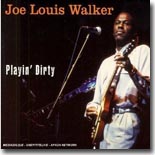 It was not until I was preparing my Top Ten list for this issue of Blues
Bytes that I realized we had never reviewed Playin' Dirty (JSP),
the latest from the prodigious Joe Louis Walker. Few blues
artists have been as consistently good as Walker since his debut disc
for Hightone in 1986. Playin' Dirty is just the latest in a long
line of top quality albums from the Bay Area guitarist. Recorded in
Paris with only two backing musicians, the album has Walker playing all
guitar parts, as well as dubbing in the harmonica and piano parts.
It was not until I was preparing my Top Ten list for this issue of Blues
Bytes that I realized we had never reviewed Playin' Dirty (JSP),
the latest from the prodigious Joe Louis Walker. Few blues
artists have been as consistently good as Walker since his debut disc
for Hightone in 1986. Playin' Dirty is just the latest in a long
line of top quality albums from the Bay Area guitarist. Recorded in
Paris with only two backing musicians, the album has Walker playing all
guitar parts, as well as dubbing in the harmonica and piano parts.
Playin' Dirty begins with "Nobody Wanta To Know Ya," a deep,
plodding song with a little touch of Hendrix to it. With the licks he
serves up, Walker makes a strong case that he needs to be taken more
seriously as one of the premier guitarists on the blues scene today. He
knows when to add effects to his guitar playing without taking it to
annoying extremes like many guitar hacks. Walker then shifts gears on
"Barefoot Rock," pumping out Chuck Berry-style riffs, but also going
into another dimension, on this up-tempo number. These two songs alone
show that Walker can pay tribute to the guitarists that influenced him
without being a slave to their exact styles.
If there's any question left about Walker's ability on guitar, he seals
the deal with the instrumental "Pickin' The Blues," on which he gives
the listener just short of three minutes of mean slide guitar.
One of the album's highlights (perhaps because I consider it to be one
of the all-time party anthems) is Walker's version of the oft-covered
New Orleans classic, "I Got Loaded." This song is more of a showcase for
JLW's vocal abilities, although he finds time to infuse it with an
extended hot blues guitar solo. It's a great version, rivaling Los
Lobos' cover of the L'il Bob & the Lollipops original.
Walker's voice has always been well-suited to a slow blues, and "Woman
Was Made To Be Loved" is his vehicle on Playin' Dirty." The five
and a half minute playing time of this song also allows him time to
stretch out on the guitar.
One that will certainly get the blood flowing is "Juicy Fruit," a jump
blues shuffle with a few rockabilly riffs mixed in. Playin' Dirty
ends with a four-minute instrumental, "From The Projects To Paris,"
which is a street corner traditional blues on acoustic guitar, heavy on
the slide.
Joe Louis Walker has never released an album that is anything less than
superb. Playin' Dirty continues that tradition.
--- Bill Mitchell
 Blues fans know what they’re getting from a Bob Margolin release….a
consistently fine mix of original songs and well-chosen covers, along
with some of the best blues guitar around. Margolin learned his craft at
the feet of some of the masters. He was a guitarist in Muddy Waters’
band for seven years before forming his own group and has played with a
veritable who’s who of blues artists too numerous to mention. Margolin
has released multiple CDs on his own for Alligator, Blind Pig, Telarc,
and others, but his latest, In North Carolina, on his own Steady Rollin’
Records, may be his best yet. Certainly, it’s his most personal.
Blues fans know what they’re getting from a Bob Margolin release….a
consistently fine mix of original songs and well-chosen covers, along
with some of the best blues guitar around. Margolin learned his craft at
the feet of some of the masters. He was a guitarist in Muddy Waters’
band for seven years before forming his own group and has played with a
veritable who’s who of blues artists too numerous to mention. Margolin
has released multiple CDs on his own for Alligator, Blind Pig, Telarc,
and others, but his latest, In North Carolina, on his own Steady Rollin’
Records, may be his best yet. Certainly, it’s his most personal.
The disc features 14 tracks, half of which are compositions by Margolin.
He also plays all the instruments, including electric and acoustic
guitar, bass, and snare drum. Margolin’s goal with In North Carolina was
to show listeners the type music he plays in his North Carolina home for
himself and his wife and pets.
Margolin’s taste in cover tunes is always first rate and there are no
exceptions here. The opening cut, a tight version of Muddy Waters’ “Tell
Me Why,” threatens to jump out of the speakers, while his lively take of
Louis Armstrong’s “You Rascal You” is also a highlight. Other standout
covers include a mournful version of Bob Dylan’s “Tears of Rage,”
featuring some inspired slide guitar, “Red Hot Kisses,” where Margolin’s
guitar work is a nice, appropriate tribute to Robert Lockwood, Jr., and
“Floyd’s Guitar Blues” is a beautifully played instrumental that pays
tribute to another of Margolin's heroes, Les Paul.
As far as original compositions go, Margolin has always possessed a
unique lyrical style that’s always entertaining. “She And The Devil” has
long been a favorite of his fans, so they will be pleased to have this
solo, acoustic version to add to their collection. The title cut does an
excellent job of conveying loneliness experienced while on the road.
“Just Before Dawn” is an original Chicago Blues tune that would have
made his mentor proud, and “Colleen” is a bouncy instrumental inspired
by Margolin’s Border Collie, Colleen, who passed away earlier this year
(and is pictured on the cover of the CD).
Capping things off is a revealing narrative about a night in the life of
a bluesman, “You Never Know,” which is taken from an article Margolin
wrote for Blues Revue a few years ago.
As expected, there’s plenty of great guitar to be found on In North
Carolina. Margolin has long been one of the most tasteful blues
guitarists around, accomplished in a wide variety of styles and never
overplaying his hand. Muddy would certainly be proud of his latest
effort and you will be, too.
In North Carolina is slated for a January 23, 2007 release, but you can
go to www.cdmojo.com and get an advance copy.
--- Graham Clarke
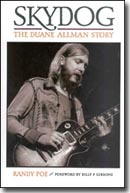 (Book review)-
Duane Allman made a tremendous impact on modern guitar in just a handful
of years. First gaining notoriety as a session guitarist at Muscle
Shoals on records by Otis Rush, Aretha Franklin, King Curtis, Herbie
Mann, and Wilson Pickett (most especially his incendiary solo on
Pickett’s “Hey Jude”), Allman’s personal musical vision was hamstrung
for years by clueless record companies, tough luck, and sometimes his
own decisions. It eventually all came together in the form of
The Allman Brothers Band, who introduced the phrase “Southern Rock” to
music and influenced a ton of followers with their revolutionary
rock/blues/jazz/classical hybrid. The band was truly one of the most
talented groups of musicians ever, and seemed to be of the same voice
when it came to making their music. However, the stabilizing force
behind the band was Duane Allman with his incredible slide guitar, which
still leaves one in awe some 35 years after his untimely
passing.
(Book review)-
Duane Allman made a tremendous impact on modern guitar in just a handful
of years. First gaining notoriety as a session guitarist at Muscle
Shoals on records by Otis Rush, Aretha Franklin, King Curtis, Herbie
Mann, and Wilson Pickett (most especially his incendiary solo on
Pickett’s “Hey Jude”), Allman’s personal musical vision was hamstrung
for years by clueless record companies, tough luck, and sometimes his
own decisions. It eventually all came together in the form of
The Allman Brothers Band, who introduced the phrase “Southern Rock” to
music and influenced a ton of followers with their revolutionary
rock/blues/jazz/classical hybrid. The band was truly one of the most
talented groups of musicians ever, and seemed to be of the same voice
when it came to making their music. However, the stabilizing force
behind the band was Duane Allman with his incredible slide guitar, which
still leaves one in awe some 35 years after his untimely
passing.
Though there have been several books published about the escapades of
the Allmans, none of them have put the focus on the band’s founder and
guiding light like Randy Poe’s Skydog: The Duane Allman Story (Backbeat
Books), which gives us as complete a look at both the man and the
musician as we’ve ever had.
Skydog covers Allman’s early years (including the terrible murder of his
father) and his childhood with recollections from people close to him at
that time, including his brother Gregg, as well as buddies and musicians
like Johnny Sandlin, Pete Carr, and Paul Hornsby. There are also
chapters devoted to the brothers’ earlier bands, such as the Allman Joys
(who were told by Dial Records owner Buddy Killen to go “look for a day
job”), Hour Glass, and their stint with the 31st of February. Poe also
shares how hearing Taj Mahal’s first couple of albums, which featured
guitarist Jesse Ed Davis, encouraged Allman to seriously pursue playing
slide guitar.
Naturally the story picks up steam with the formation and development of
The Allman Brothers Band. Poe is really at his best here, telling
stories behind the recording of the band's first two albums as well as
their non-stop live appearances. Most informative is the account of
their 1971 appearance at Fillmore East, which led to what is considered
to be one of the finest live recordings ever.
The chapter on Allman’s appearance at Eric Clapton’s Derek & the Dominos
sessions in Miami for what would become Layla and Other Assorted Love
Songs should be required reading for any fan of rock guitar. Interviews
with the late producer Tom Dowd (who also produced several of the ABB’s
biggest records) and musician Bobby Whitlock provide a bird’s eye view
into the proceedings and shed light on the incredible rapport
established between Skydog and Slowhand.
Though a stellar musician, Allman was not without his character flaws
and none of them are glossed over in Skydog. His drug use and
undependability, as well as his failed relationships, are discussed,
though they are presented as part of the whole story. Allman’s intense
personal drive to succeed played a role in these flaws, though he was
trying to clean up just prior to his death.
Poe doesn’t stop the story after Allman’s tragic death from a motorcycle
accident in 1971. The star-crossed history of The Allman Brothers Band
is brought to the present, and it’s amazing how strongly Allman’s
influence is still felt in the band, as well as in countless rock,
blues, and even country guitarists.
There’s also a meticulously detailed chapter on Allman’s guitars, a
“Where Are They Now” section on some of the book’s sources, and a
detailed discography on albums and sessions the incredibly prolific
Allman played on.
In the prologue, Poe remembers how he, as a nine-year-old, stumbled onto
Allman playing at Daytona Beach during a family vacation. Obviously,
hearing Allman’s guitar changed Poe’s life as well as many others who
encountered it. Skydog: The Duane Allman Story is a well-written and
researched study of an influential young musician who left us much too
soon.
--- Graham Clarke
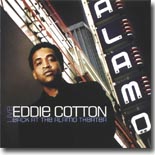 Is it possible for lightning to strike twice in the same place? In the
case of Eddie Cotton and the Alamo Theater, it certainly is. Six years
ago, Cotton released an incredible live set recorded at the Alamo
Theater on legendary Farish Street in Jackson, Mississippi that garnered
rave reviews from many blues publications. Cotton has toured nationwide
almost nonstop since then, but did stop long enough to make a return
engagement at the Alamo. Live Back At The Alamo Theater may actually
surpass the energy and excitement of the original.
Is it possible for lightning to strike twice in the same place? In the
case of Eddie Cotton and the Alamo Theater, it certainly is. Six years
ago, Cotton released an incredible live set recorded at the Alamo
Theater on legendary Farish Street in Jackson, Mississippi that garnered
rave reviews from many blues publications. Cotton has toured nationwide
almost nonstop since then, but did stop long enough to make a return
engagement at the Alamo. Live Back At The Alamo Theater may actually
surpass the energy and excitement of the original.
Cotton has been recognized as one of the biggest up-and-coming talents
for a while now, long enough that he should probably be considered as
having arrived. His talents include prodigious guitar from the Albert
King School of influence, a soulful, supple voice confident enough to
tackle anything from the Al Green catalog, and a spirit of showmanship
that is second to nobody these days......the complete package for a
modern-day bluesman.
The Mississippi Cotton Club (James “Hot Dog” Lewis - keyboards, Myron
Bennett - bass, Xavres Good - drums) is in superb form and are joined
this time around by Carl Russell on harmonica on several tracks and the
Jackson Horns (Kimble Funchess - trumpet, Lorenzo Gayden - trombone,
Booker Walker and James Evans - saxophones). The horns add plenty to the
Cotton Club’s sound, making a strong band even more potent.
The CD consists of ten tracks, four original tracks and six covers, and
clocks in at over 78 minutes. Cotton’s taste in cover material is
impeccable, ranging from soul (Latimore’s “Straighten It Out,” a
longtime staple of Cotton’s live set, and a breathtaking reading of the
Brothers Gibb’s “How Can You Mend A Broken Heart” that nearly equals Al
Green’s take from the early ’70s), to soul/funk (James Brown’s “Funky
Good Time”) to blues. The blues covers consist of three Albert King
tunes, “I’m Gonna Leave You,” which features an electrifying sax break
from Evans, a smoldering version of “I’ll Play The Blues For You,” with
some of the best guitar work on the disc and another strong sax break,
this time from Walker, and “Match Box Blues,” which closes the disc in
grand style.
As far as original compositions go, the opening track, “I Need Your
Love,” is a funky first cousin to Jimmy Rogers’ “That Ain’t It.” “Love
War” finds a strong groove and features tasty guitar and horns, as does
the spicy “All Night Long.”
It is obvious that Cotton is in familiar surroundings. His rapport with
the audience is relaxed and sure. He knows what they like and what
they’ve come to hear and he delivers the goods. His guitar work is
magnificent throughout the disc as are his vocals. Clearly, he was at
the top of his game during this 2004 appearance.
Hard as it may be to believe, Cotton still doesn’t have a recording deal
with a label, major or independent. He produced and released this disc
himself. It can either be picked up at local record stores in the
Jackson, MS area or at Cotton’s forthcoming website (look for it in
February). If you haven’t had a chance to see Eddie Cotton in person,
you really should make an effort to do so. Until then, Live Back At The
Alamo Theater is the next best thing.
--- Graham Clarke
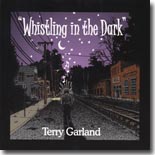 Tennessee guitarist Terry Garland has released four previous albums
featuring his unique and energetic interpretations of classic blues
tunes, and has gradually added more and more of his own compositions
with each subsequent release. Garland’s latest effort, Whistling In The
Dark (Silvermoon Records), is his first release of original songs.
Tennessee guitarist Terry Garland has released four previous albums
featuring his unique and energetic interpretations of classic blues
tunes, and has gradually added more and more of his own compositions
with each subsequent release. Garland’s latest effort, Whistling In The
Dark (Silvermoon Records), is his first release of original songs.
Garland is master of the slide and acoustic guitar and his gruff vocal
style sometimes reminds you of John Hiatt, especially on the opening
cut, “Get Bitchy,” and “Vacation Due,” both of which would be pretty
decent fits on a Hiatt album. Some of his songs touch on current events
(“Too Much Blood,” “When You See Their Eyes,” and “Soapbox Saturday
Night”), while others cover familiar blues topics in new and interesting
ways, such as the harrowing “Jim Beam and the Bible” and “Stumbling In
the Dark,” which are both studies of man’s constant battle between God
and the devil. “Walk With Me (aka Minnie’s Song)” also touches on the
same topic with satisfying results.
“Memo to Jo” is a sweet love letter to Garland’s wife, and you can feel
the loneliness permeating from “Without You.” One of my favorite cuts is
“Hard Luck Blues,” which has the classic line “It’s not for love of
money that’s turning me gray/It’s just the not having enough I hate.” I
imagine a lot of listener will nod their head to that couplet.
Though Garland plays mostly solo, he’s ably assisted on several tracks
by piano (Bruce Courson or Butch Taylor), bass (David Owen), percussion
(Adrian Olsen), or harmonica (The Nighthawks’ Mark Wenner).
Also worth noting are the creative Robert Crumb-like graphics of the
packaging. The entire disc has a warm, intimate, relaxed feel. Whistling
In The Dark is a vibrant well-crafted set that will please acoustic
blues guitar fans.
--- Graham Clarke
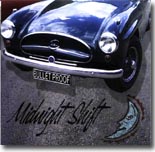 Midnight Shift is a four-piece band that recently has been burning up
the tracks in Pennsylvania. Featuring frontman Mike Mettalia on
harmonica and vocals, the band boasts a powerful blues sound that
borrows from rock & roll and rockabilly as well. Having competed in the
IBC in Memphis in 2005, the band has released Bullet Proof, which is a
solid representation of their talents.
Midnight Shift is a four-piece band that recently has been burning up
the tracks in Pennsylvania. Featuring frontman Mike Mettalia on
harmonica and vocals, the band boasts a powerful blues sound that
borrows from rock & roll and rockabilly as well. Having competed in the
IBC in Memphis in 2005, the band has released Bullet Proof, which is a
solid representation of their talents.
At the time of the recording, Midnight Shift consisted of Mettalia,
“Lonesome” George Riola on guitar, Doug Brown on bass, and Nick Lauro on
drums. Since the album’s recording, the band has gone through some
changes, with Mettalia being the lone holdover. However, the band as
recorded shows they can jump from straight blues to rock with ease.
Their opening track, “Built for Speed,” is a fine Chicago-style shuffle.
“Heartsick” is a rock and roller with some great piano by guest Dan
McKinney. “Unemployment Risin’” is another blues track with a smooth
guitar break by Riola. “I Don’t Remember” is noteworthy for some amusing
lyrics by Mettalia, while the title cut gives him a chance to display
his impressive harmonica chops.
“Jump This Dive” is a nifty little piece of jump blues, and “Work Don’t
Work” would have been a solid fit as a Billy Boy Arnold single from his
Vee-Jay days. “Heart To Break” features a guest vocal by Marie James (who
also appears on “Goin’ Home”) and another notable guitar solo from
Riola, who also smokes on “Midnight Shift.” “The L & N” is a lively
train blues songs, and “Calabash” is a Chuck Berry-style rocker that
closes out the disc.
Mettalia wrote most of the tracks for Bullet Proof (the lone covers
being Cleanhead Vinson’s “Hold It Right There” and John Lee Hooker’s
“Goin’ Home”), and he proves to be a gifted composer as well as a
harmonica ace. Bullet Proof is a rock-solid disc of blues and rock from
a band that knows its stuff. For more information, go to the band’s
website, www.mnightshift.com.
--- Graham Clarke
The Saucecats are Frankenmuth, Michigan’s fun and friendly roots band.
The gifted group is comprised of eight extremely talented
multi-instrumentalists. The core cats responsible for the eclectic music
include Maureen Lee (accordion/keyboards), Dave McGregor
(fiddle/guitar), Nick Vermis (drums/harmonica), Kim Braeutigam (bass),
and Perry English (rubboard/percussion). Since recording their debut, Some Like It Hot, the band has a new brass section. The reedmen are Zucko (sax/guitar) and Kelly Hengy (trombone/percussion) while Mike
Clark adds B-3 organ.
Many of the songs on The Saucecats' second independent release, Havin'
Fun, are staples from
their live repertoire. The catchy rhythm of "Early In The Mornin’" ensures
you won’t stand or sit still. On it, the horns are given a chance to
blast while the trombone rumbles, the harmonica reverberates, and the
congas clank. It features a clever arrangement, but the vocals are
shrill and harsh.
An agitation that most of us have experienced is
expressed on "Mother In Law." Thanks to the rhythm pattern’s change,
honking sax, and bellowing trombone, the song becomes romantic and
classy. The doo wop background vocals are reminiscent of Bowser from Sha
Na Na. Yet ironically, and perhaps purposefully, the track becomes as
annoying as in-laws.
With a mix of zydeco and rock ‘n’ roll, "On A Night
Like This" is totally grooving. The credits aren’t clear as to who sings
which songs, but they reveal that many band members contribute vocals.
Some of the singers are better than others. The lead vocals on
"Summertime" try to emulate Louis Armstrong, but the vocalists don’t do
justice to this classic Gershwin song.
"Oh, What A Day," an original
number, doesn’t fit the style of the rest of the songs on the CD. The
melody is a country hoedown combined with a waltz and a polka. The
lyrics – told from a parent’s point-of-view – tell about a day in the
life of raising kids. Although "All Along The Watchtower" has been
over-recorded, you’ll enjoy the timing, beat, and reggae rhythm on this
version.
Like the opening original track, "Let’s All Go," The Saucecats are drowned
in a New Orleans tradition. You won’t be surprised to learn their motto
is, “we will play for gumbo.” This sophomore release confirms The
Saucecats possess proliferate talent. However, the energy and frolic
from their stage party hasn’t transitioned to the studio. With more
guidance and originality, The Saucecats will have their recipe
perfected.
--- Tim Holek
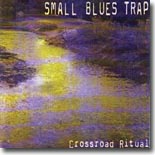 This is the first time that I’ve heard of a blues band from Greece, and
I wasn’t sure what to expect – it’s a lot more than “Can a white man
sing the blues”!
I have to say, right at the beginning, that I’m impressed by Small
Blues Trap on Crossroads Ritual (Shelter Home)
– they know what the blues is all about.
This is the first time that I’ve heard of a blues band from Greece, and
I wasn’t sure what to expect – it’s a lot more than “Can a white man
sing the blues”!
I have to say, right at the beginning, that I’m impressed by Small
Blues Trap on Crossroads Ritual (Shelter Home)
– they know what the blues is all about.
The album gets off to a slow start with “The Blues That’s Callin’” – a
stripped down blues with harmonica, vocal, and not much else – it really
generates an atmosphere and then makes way for “Cold In Hand And
Lonesome” , a moody, slow, blues with some really lovely harmonica
riffs.
The tempo starts to pick up with “If You Flag My Train” – this is a
superb track, with all sorts of old blues influences showing through –
Bukka White, Son House, Muddy Waters, all contributing to the music, and
again some more great harmonica from Paul Karapiperis.
The title track to the album, “Crossroads Ritual,” showcases some slide
guitar work that really gels. Vocalist and harmonica player Karapiperis
shows that he can also handle a bit of slide guitar work, and the
resonator guitar that he uses has a rich tone to it.
My only real criticism of this fine CD is the lack of sleeve notes. The
music is good, the production is good – but please, tell us more about
the band, the music, the recording!!
I’m assuming that all of these tracks are originals, written by the
band, which makes their talent even more impressive.
On track eight, “I Scream, I Play, I Feel,” Panagiotis Daras displays some
fine slide guitar work, and it’s hard to choose which of the two
guitarists produces the best sound on slide on this album.
On the “Rusty Train,” Paul Karapiperis takes his vocals onto a different
level, and he sounds a lot like an early Joe Cocker – not a bad thing!
I have to mention the bass playing of Lefteris Besios here, because he
really shines through on this track.
This reinforces the impression that this band can change the tone, and
style, of their music without a problem. Rather than just sounding the
same the whole way though the album, they let all of their different
influences peep through from the background.
Two of the tracks have a guest appearance from sax player Angelos
Psarras, “Up & Down” and “VAT69,” which again changes the style of music.
Leaving his mention till last – by no means the most insignificant
member of the band – Drummer George Poulos lays down some excellent
rhythm section foundation of “Your Mother Told You That I Play The
Devil’s Music” and “Remembering Peter” – this letter track being my
favourite on the CD and I assume that the Peter referred to is Peter
Green as the track immediately brought him to mind with the beautiful
guitar work from Daras.
--- Terry Clear
Coming back full stride with his latest release, Name Your Poison
(Mercy Seat Records), The Rich Fabec Band has managed well to
serve up some pretty tasty blues/rock courtesy of Fabec’s blistering
guitar work and very capable songwriting.
The band consists of Fabec on lead guitar and vocals, Danny Vinson on
bass and John “big sound” Shadowens on skins. Both Vinson and Shadowens
surround Fabec with a rhythm section one can be proud of. One noteworthy
accomplishment from Fabec’s last recording to this one is his improved
vocals that have seemed to find their niche in the blues/rock idiom that
Fabec delivers beautifully being the sole vocalist on Name Your
Poison.
The opening tune, "One Da," leads off in fine form in a slightly
rollicking mood giving Fabec the room to show off his picking prowess.
In "Walk Me Home" we get treated to Fabec’s slide work in all its fine
glory. "We’ll See" smolders nicely as the tempo slows down a bit for
some laid back blues. But a few tunes later on "Lew’s Blooz" Fabec
speeds things up considerably on this fast paced instrumental. Here,
Fabec has something to show for all those years playing and teaching. It
looks like it paid off in spades. We take a slight diversion on "Tears
in the Rain" with a smoothly rendered instrumental that once again
proves Fabec knows how to play in any style and convince us of that
fact. Closing out the disc, Fabec chooses to entertain us with just his
voice and some enjoyable Delta slide on the tune "Midnight Train."
You should truly take a listen to "Name Your Poison" and become a Rich
Fabec fan like myself. No disappointment here. For more info and to
sample some tunes, check out
www.richfabec.com and
cdbaby.com/cd/fabec
for info and samples from his first release. Good listening.
--- Bruce Coen